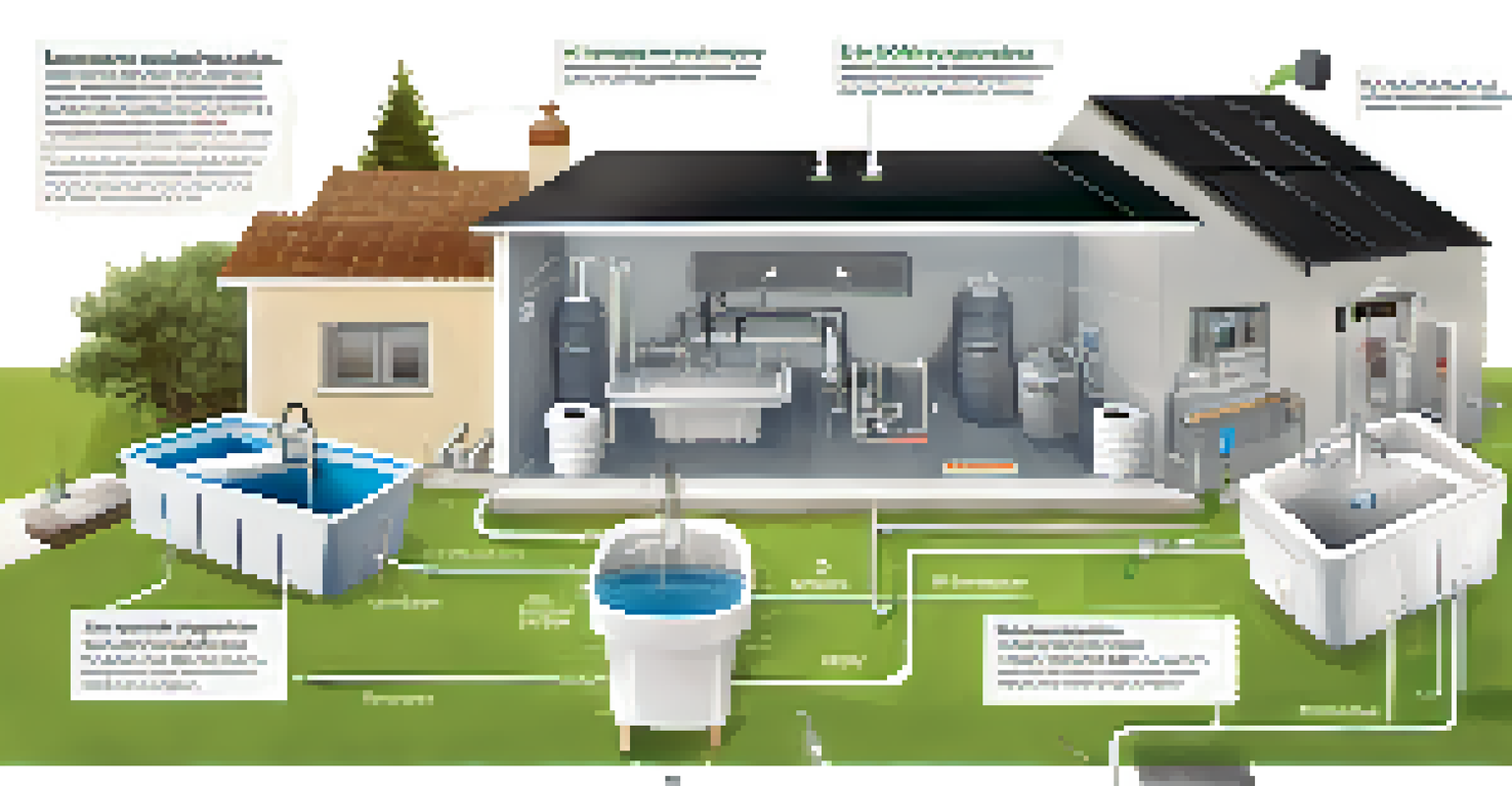The Benefits of Installing a Greywater Recycling System

Understanding Greywater: What Is It and How Does It Work?
Greywater refers to the wastewater generated from household activities like washing dishes, laundry, and bathing. Unlike blackwater, which comes from toilets and is heavily contaminated, greywater can be treated and reused. Understanding this distinction is crucial as it informs how we can reclaim water for safe use in irrigation and other non-potable applications.
Water is the driving force of all nature.
Installing a greywater recycling system involves plumbing modifications that allow you to divert this wastewater from the sewer system for reuse. Systems can be simple, like a rain barrel, or complex, involving filtration and treatment processes. Regardless of the complexity, the goal remains the same: to reduce freshwater consumption and manage water resources more effectively.
In essence, greywater recycling systems harness the power of what we typically consider waste. By integrating these systems into our homes, we not only conserve water but also embrace a more sustainable lifestyle. This shift in perspective can lead to significant environmental and economic benefits.
Top Environmental Benefits of Greywater Recycling
One of the most significant environmental benefits of greywater recycling is the reduction of water demand. With increasing population and climate change impacting water availability, finding ways to recycle water is crucial. By reusing greywater, we can decrease the extraction of freshwater sources, helping to preserve ecosystems and biodiversity.

Additionally, greywater recycling reduces the volume of wastewater that ends up in sewage treatment plants. This not only lessens the burden on municipal systems but also decreases the energy and resources needed for treatment. In turn, this leads to lower greenhouse gas emissions and a smaller carbon footprint for your household.
Greywater: A Sustainable Resource
Greywater, the wastewater from household activities, can be treated and reused, significantly reducing freshwater consumption.
Moreover, using greywater for irrigation can enhance soil health. Unlike chemical fertilizers, greywater often contains nutrients beneficial to plants, promoting healthier gardens and landscapes. This natural fertilization process can lead to more resilient plant growth and reduced need for synthetic fertilizers, creating a win-win situation for both the environment and your backyard.
Economic Advantages: Saving on Water Bills
One of the most immediate benefits of installing a greywater recycling system is the potential for significant savings on your water bill. By reusing water for irrigation or other non-potable uses, you can reduce your overall water consumption. This reduction translates into lower monthly bills, providing financial relief over time.
The greatest threat to our planet is the belief that someone else will save it.
Moreover, as water scarcity becomes an increasingly pressing issue, many municipalities are implementing tiered pricing for water usage. This means that the more water you use, the higher the rate you pay. By recycling greywater, you can avoid the penalties of higher tiers, allowing you to manage your costs more effectively.
Finally, investing in a greywater system can increase your property value. Homebuyers are increasingly aware of sustainability and the benefits of eco-friendly features. A well-installed greywater system can be an attractive selling point, making your home more appealing in a competitive real estate market.
Enhancing Water Efficiency in Your Household
A greywater recycling system can significantly enhance water efficiency in your home, allowing you to maximize every drop. By directing water from sinks, showers, and washing machines directly to your garden or toilet, you can ensure that water is being utilized optimally. This innovative approach to water use can lead to a more sustainable lifestyle.
The beauty of greywater systems is their ability to complement existing water-saving fixtures and practices. When combined with low-flow faucets and efficient appliances, you can achieve remarkable reductions in water consumption. This holistic approach not only benefits the environment but also encourages a culture of conservation within your household.
Financial Savings from Recycling
Installing a greywater recycling system can lead to lower water bills and increased property value through sustainable features.
Moreover, incorporating greywater recycling instills a sense of responsibility and awareness about water use in your family. As everyone learns to adapt to this system, discussions about sustainability and resource management become part of daily life. This collective shift can foster a deeper connection to the environment, encouraging future generations to prioritize conservation.
Health Considerations: Safety and Regulations
While greywater can be reused safely, it’s essential to understand the health considerations involved. Proper treatment and filtration are necessary to eliminate harmful pathogens and contaminants. By ensuring that your system meets local health regulations, you can confidently use greywater without compromising safety.
In many regions, there are specific guidelines governing the use of greywater. These regulations often dictate what types of greywater can be reused and how it must be treated. Familiarizing yourself with these laws is crucial for ensuring compliance and protecting public health.
Additionally, some homeowners may have concerns about using greywater in their gardens. It’s important to note that well-managed greywater can be a safe source of irrigation water, especially for non-edible plants. By following best practices and regulations, you can reap the benefits of greywater while prioritizing health and safety.
Choosing the Right Greywater System for Your Needs
When considering a greywater recycling system, it’s essential to assess your specific needs and circumstances. Factors such as available space, budget, and water usage patterns play a crucial role in determining the best system for you. Simple systems may suffice for smaller households, while larger homes may require more sophisticated setups.
Researching different types of greywater systems is key. Some systems are designed for easy DIY installation, while others may require professional assistance. Understanding the pros and cons of each type can help you make an informed decision that aligns with your lifestyle and goals.
Health and Safety Regulations Matter
It's crucial to understand and comply with local regulations regarding greywater treatment to ensure safe usage in your home.
Don’t forget to consider the long-term maintenance of your greywater system. Regular upkeep is necessary to ensure optimal performance and safety. By choosing a system that fits your maintenance comfort level, you can enjoy the benefits of greywater recycling without added stress.
Getting Started: Steps to Install a Greywater System
Installing a greywater recycling system might seem daunting, but breaking it down into manageable steps can simplify the process. Start by conducting a water audit to determine how much greywater your household generates. This information will help you design a system that meets your needs and maximizes efficiency.
Next, familiarize yourself with local regulations regarding greywater reuse. Understanding the legal framework will guide your installation process and ensure compliance. It’s wise to consult with local authorities or a professional installer who can provide insights into the specific requirements in your area.

Finally, whether you choose to take on the installation as a DIY project or hire professionals, make a plan for ongoing maintenance. Regular checks and cleanings will keep your system running smoothly and safely, allowing you to reap the rewards of greywater recycling for years to come.